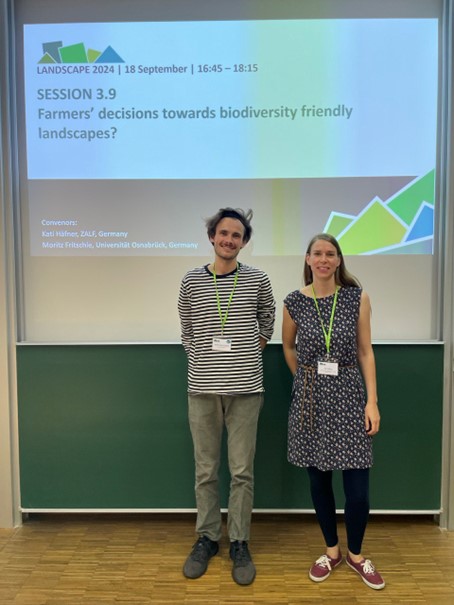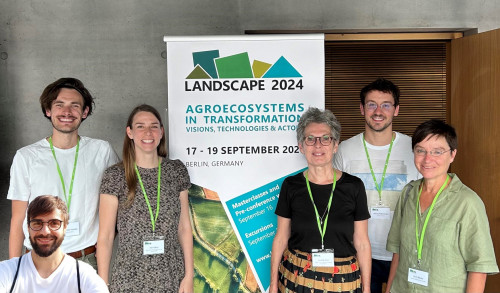SHOWCASE researchers presented project results on farmers’ perceptions, decision-making and networks towards biodiversity management at the LANDSCAPE 2024 Conference in Berlin on 17-19 September together with sister project FRAMEwork. This conference with the topic ‘Agroecosystems in Transformation: Visions, Technologies and Actors’ served as an important platform for fostering dialogue between researchers in the field of sustainable agriculture and biodiversity conservation.
One highlight of the conference was the session titled “Farmers’ decisions towards biodiversity-friendly landscapes,” which was organised collaboratively by Kati Häfner from Leibniz Centre for Agricultural Landscape Research (ZALF) representing SHOWCASE, and Moritz Fritschle from the University of Osnabrück (UOS), representing FRAMEwork. This session provided an opportunity for researchers to present their findings and engage in meaningful discussions on the various factors influencing farmers' decisions to adopt biodiversity-friendly practices in their landscapes.

Image: Session convenors Kati Häfner from SHOWCASE and Moritz Fritschle from FRAMEwork at their organised session “Farmers’ decisions towards biodiversity-friendly landscapes”
In her presentation, Lena Schaller (ZALF) focused on the perceived (non-)economic costs associated with implementing biodiversity measures as articulated by farmers. Schaller's findings emphasised that while many farmers recognise the importance of biodiversity for long-term agricultural sustainability, they often weigh these potential benefits against immediate economic costs, which can deter them from adopting such practices.
Fabian Klebl (ZALF) contributed to the session by exploring farmers’ preferences concerning landscape connectivity and the spatial arrangements of biodiversity conservation efforts. His research highlighted that farmers are more likely to support biodiversity initiatives that are perceived to enhance connectivity between habitats, thereby fostering greater ecological resilience. These preferences underscore the importance of tailored conservation strategies that align with farmers' operational realities and landscape contexts.
Additionally, Kati Häfner presented her findings on farmers' acceptance of different incentive designs—both public and private—to promote biodiversity. Her analysis indicated that farmers are more likely to engage with programs that are transparent, equitable and offer clear benefits. Understanding the factors that influence farmers' acceptance of these incentives is crucial for policymakers looking to implement effective biodiversity conservation measures.
Overall, the insights shared during this conference session not only shed light on the decision-making processes of farmers but also underscored the importance of aligning biodiversity initiatives with farmers' economic needs and landscape perspectives. The collaborative environment fostered by the SHOWCASE and FRAMEWORK projects further emphasises the significance of interdisciplinary approaches in addressing the challenges of biodiversity management in agricultural contexts.
Image: Researchers from SHOWCASE and its sister project FRAMEwork met at the LANDSCAPE 2024 conference to discuss their latest findings on farmers’ perceptions, decision-making and networks towards biodiversity management. (fltr: Fabian Klebl, Moritz Fritschle, Kati Häfner, Annette Piorr, Thomas Rellensman and Iris Bohnet; missing in the picture: Lena Schaller, who joined online)
